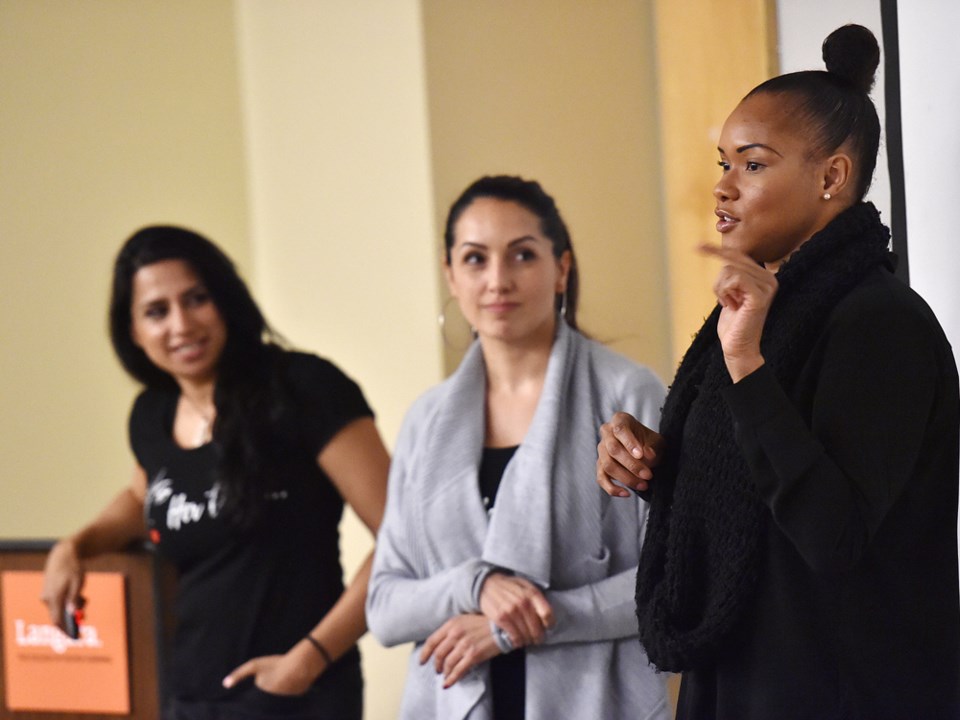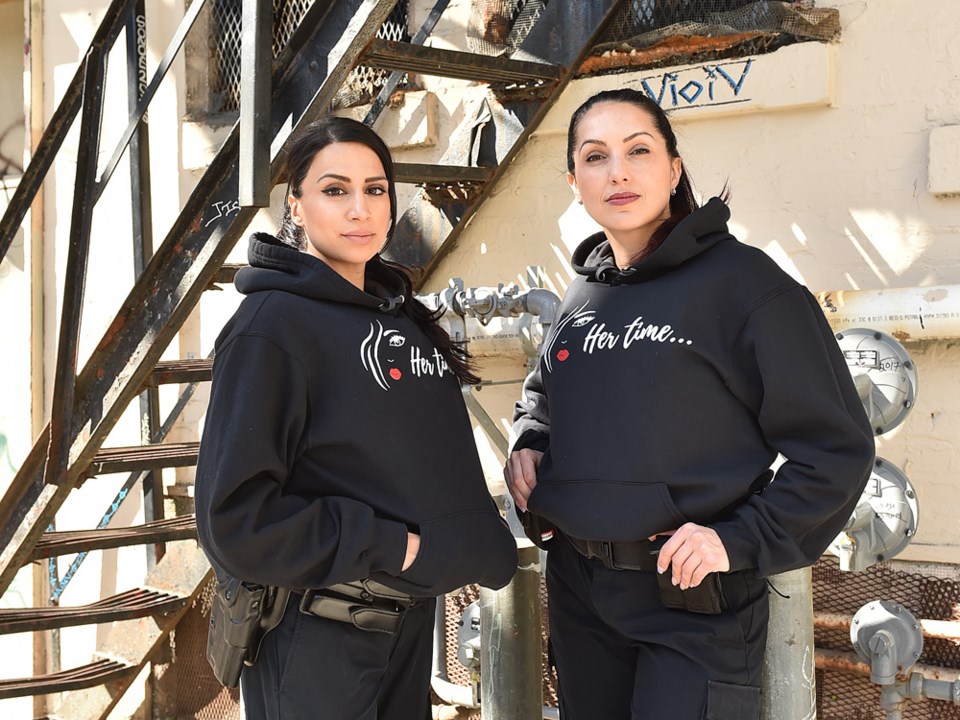Two Vancouver police officers have teamed up in an effort to discourage young women from getting involved in organized crime.
Detectives Sandy Avelar and Anisha Parhar are partners in the department’s gang unit — the pair is currently the only female gang frontline partnership in Canada. Avelar is in her 20th year with the Vancouver police. Parhar spent five years working for the provincial gang unit before joining the VPD nine years ago. After various postings within the department, both joined the gang unit and in 2016 became partners.
Throughout their work over the years, both saw a need to educate teens and young women about the dangers of becoming involved with men in organized crime, and separately had an idea for a presentation for teens and young adults.
“Guns, gangs and drugs go hand-in-hand, we know that,” Avelar said. “What we’re seeing is that girls are being used, they’re becoming directly involved in it. They’re being used as couriers in the drug trade. They are the right-hand woman of the guy who’s in charge of these [drug] lines.”
Parhar worked in covert intelligence during her years with the provincial gang unit, working on some high profile cases — including the Surrey Six homicide — and part of her job was to monitor wire taps.
“I had the opportunity to listen to these guys and girls when they didn’t think anyone was listening, so it was a very interesting take on how they think,” she said.
“These girls are no longer just there for pillow talk and to be on the arms of these guys — they’re now getting directly involved,” Parhar said.
Her Time
Once they became partners, Avelar and Parhar started working on the presentation, Her Time, aimed at educating people on the risks of dating men who are involved in organized crime or drug trafficking, and teaming up with women who have lived, and survived, that life.
“There’s a lot of information that we can bring to the public and try to educate them but what’s more powerful than hearing the story from someone that’s lived it,” Parhar said. “And then to see them actually stand next to two police officers and be friends, that’s a powerful message as well.”
In December, they officially launched Her Time. While the program has the support of the department, it is not an official Vancouver Police Department program, and the two officers do the work and presentations on their days off.
During a recent presentation to a group of sociology students at Langara College, the officers told the students many of the women they see getting involved with men in gangs are, on paper, not ones anyone would expect to be drawn to that lifestyle.
“We’re finding girls from affluent families, we’re finding educated girls going to university, we’ve even found girls that have become lawyers and doctors that are dating a lot of guys involved in organized crime,” Parhar said. “They’re aware that their boyfriends do this but it’s the glamour and the status of it. They’re in the nicest, newest cars. They’re wearing the nicest shoes. They’ve got the nicest, updated bags.
“These are beautiful girls, on the arms of these drug traffickers, that don’t have any history, have no criminal record, in fact, have had no negative interaction with police at all.”
Lure of ‘the lifestyle’

Eboney Chipman was just the kind of girl they’re talking about.
Born in Nassau, Bahamas, in 1989 she moved to Vancouver where she grew up with her mother, step-father and siblings.
“I had such a good life growing up,” she said. “Birthday parties, all the neighbourhood kids came. My step-father was in my life. Yearly passes to Science World, the aquarium.”
At 20, she was working at a clothing store in a mall when a chance meeting at a nightclub changed the course of her life.
“I was at a club dancing and this random girl comes up to me and she’s like, ‘You dance really good,’ and I’m like, ‘OK, you’re weird.’”
The two started talking and became friends. The woman ended up moving in next door to Chipman and her sister. One day, she said, her friend invited her to go to work with her. Chipman said she, again, thought this was strange but went along and ended up at Brandi’s Show Lounge downtown where her friend worked as an exotic dancer.
“I was so naïve at the time,” she said. “I was really scared. I was so, so scared.”
But she went ahead and danced that night.
“The first night, when I made like 500 bucks at 20 years old, I was like, ‘This is awesome.’ And the money just went up and up and up and up,” Chipman said.
That was the same year she started dating her ex-boyfriend. At first, she said, he was a “normal guy,” who also worked at the club, but a couple of years into the relationship he started selling drugs.
She said she knew what he was doing was wrong but the money and lifestyle were enticing.
“I don’t want to glamourize it, but I got to reap all the benefits — vacations, staying in five-star hotels, nice clothes and the shoes and the bags, the cars, all that stuff. That was my life.”
In 2006, Chipman’s boyfriend was heading to Bellingham with a large amount of ecstasy pills, and she went along with him. It was a routine trip for the couple.
“When he would go to the states, I would go with him and I’d just go shopping, thinking nothing of it.”
He had arranged to meet another man in the parking lot at Bellis Fair mall, and Chipman waited in the car with her boyfriend for three hours for him to show up. Eventually, she said, a car pulled into the parking lot and he told her she could go into the mall.
“I open the car door and it’s like right out of a movie. This was a Saturday afternoon, a hot day in May, May 6. The mall parking lot was full, the mall was full of f***ing people, and about 10 cars pulled out of parking spots,” she said. “I had FBI, DEA, immigration, customs, local and state police, they all got out of the cars with vests, guns pointed at me, yelling, ‘Get on the ground. Get on the f***ing ground.’
“I got on the ground. I was arrested. So was my ex-boyfriend.”
After she was arrested, Chipman was sitting in the back of one of the police cars when the officer in charge knocked on the window.
“They rolled down the window, he looked at me and said, ‘I hope you love him because he just took away a big part of your life.’”
Rebuild
Chipman said she had about eight possible charges against her but because she was “just” his girlfriend she was charged with knowing about a crime and failing to report it.
“I ended up being convicted because as much as the judge wanted to let me go, in court, in federal court, he said to me, ‘I would love to let you go home but I cannot have girls thinking that they can date men like this, be involved in this lifestyle, and get away with it.’”
She served eight months in prison. Her ex, who she never spoke to again after they were arrested, was sentenced to three and a half years, and the couple’s legal fees ran upwards of US $35,000. Chipman could have been sent to the women’s prison in California but asked the judge if she could stay in Washington state so her family could visit. That meant serving out her sentence in a detention centre usually meant to house prisoners temporarily before getting shipped off to prison.
Chipman didn’t see the light of day for eight months — she became depressed, cried every day and lost a lot of weight.
She was one of the lucky ones because her family remained supportive. Her parents and siblings were sad, she said, not mad or upset.
“I’ve never seen my older brother cry. When they came to visit me in jail my whole entire family had blood-shot eyes from crying,” she said.
“It made me feel so small as a person because all they did my entire life was just encourage me to be better and I did the exact opposite. It really affected me in the sense that I just let them down because even though no one said it, I knew that I did.”
After getting out of prison, Chipman moved in with her mother and started rebuilding her life.
“It was definitely a slow process because I didn’t have any of the same friends and I sure didn’t want to have any of the same friends,” she said.
She started working at a gym and got more and more involved in fitness training and started body building.
“I tried competing once and I did well and I just went with it,” Chipman said, adding that she won the Canadian nationals in 2012 in the bikini category and became a professional body builder.
She met Avelar through body building and signed on to share her story through Her Time.
Chipman shares her story in the hopes of helping steer others away from going down the same path.
“The effect it had on my family, my friends, trying to just re-introduce myself back into society after not seeing f***ing fresh air for eight months. It was hard. It was so, so hard,” she said. “If I can prevent anyone from going through that, that makes me happy.”



